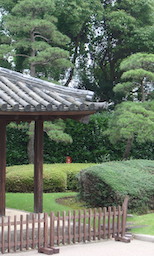Jodo Wasan 23
Their countenances, dignified and wonderful,
are beyond compare;
Their bodies, delicate and subtle, are neither human nor deva.
Theirs is the body of emptiness, the body of boundlessness,
So take refuge in Amida, the power of nondiscrimination.
Nirvana
Nondiscrimination cannot come by means of our self-induced calculation because self is ultimately an illusion. It has no actual power except to ensnare and capture us. When no self - not-self - emptiness - is in play, buddha nature is able to function spontaneously (jinen) according to its essential character. The attainment of nirvana - the body of emptiness, the body of boundlessness - is spontaneous and is the fulfilment of Amida's shinjin, which has been alive in beings and leads them to the dharma. It is just one instance of the spontaneous, free or natural power of the dharma (jinen &/or honi).

Dharma nature is free, natural and spontaneous. It actually walks the path for us if only we will let it; if only we will let go of our own conceits. The spontaneous activity of the dharma is the underlying theme of all of Shinran's writing but especially the hymns. We become intensely aware of this as we draw closer to them.
It is impossible to resist the sense that the hymns are being composed by one whose heart was full with the song and joy of shinjin, and the nembutsu of adoration: Shinran, completely open to the dharma and free of his own self. As a manifestation of the seventeenth Vow of Amida Buddha1 the wasan are also vehicles for openness to the dharma - freeing us from our self absorption.
Needless to say, from the time that beings first awaken to Amida's inconceivable light until the dawning of nirvana, it is the power of not-self, of emptiness, Amida's shinjin, or buddha nature which takes each step. It can be heard in the sound coming from within that manifests itself as Namo Amida Butsu.
1: If, when I attain Buddhahood, the countless Buddhas throughout the worlds in the ten quarters do not all praise and say my Name, may I not attain supreme enlightenment. (CWS, p. 13)